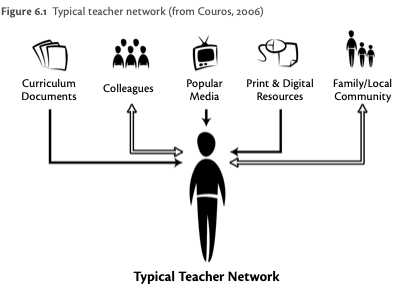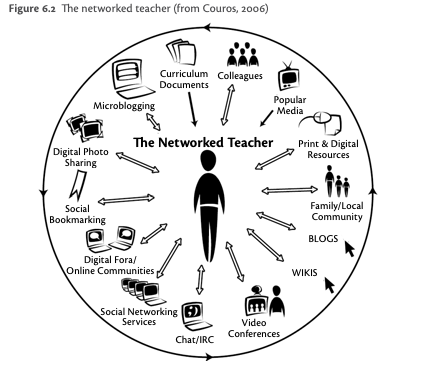Dr. Brad Baker is not only a “proud member of the Squamish Nation but Associate Superintendent of Indigenous Education”, a stepfather, a grandfather, a learner and a teacher. Finishing his doctorate from UBC in 2021, Dr. Baker completed his Ph.D. in Education with a focus in “Indigenous leadership within the field of education”. With over 26 years in education within North Vancouver, he has most recently been appointed as Associate Superintendent of Indigenous Education at the Ministry of Education. He has utilized social media and his professional learning network to make headway in Indigenous issues and grow community by sharing his knowledge and his father’s residential school survivor story.
Community communications go beyond blogs and social media shares; how does a PLN help and hinder the development of thoughts and ideas in education discourse?
PLE is made up of “the tools, artifacts, processes, and physical connections that allow learners to control and manage their learning” (Couros). A Personal Learning Network can be defined as “the sum of all social capital and connections that result in the development and facilitation of a personal learning environment” (Couros). While creating your professional/personal learning network “requires a significant time commitment initially, these losses can be regained quickly through networked efficiencies, enhanced learning experiences, and new opportunities” (Couros). The benefits of having a strong PLN most definitely outweigh the time-consuming nature it may take to build. Additionally, I would like to highlight several strategies I intend to use to grow my own!
PLN Strategies:
Immerse Yourself
Learn to Read Social Media
Strengthen Your PLN
Know Your Connections
PLNs Central To Learning

How do educators create discourse?
During Brad Baker’s EDCI 338 podcast episode, they note that “your professional learning community is really your support system”. Being an open-minded educator will give you the opportunity to create positive discourse and learning. A specific style of teaching is highlighted in Alec Couros’s Developing Personal Learning Networks for Open and Social Learning. Open teaching is a method that encourages learning experiences that are “open, transparent, collaborative, and social” (Couros). This includes activities such as “promotion of copyleft content licenses”, “modelling of openness” and promoting “ learning environments that are reflective, responsive and student-centred” (Couros).
What is the role of social media in education?
Dr. Barker shares his love of social media as he has found an “affinity to community” surrounding Indigenous education as he frequently travels, sharing his story and his father’s as a residential school survivor. Finding openness in the conversation in the history of “inclusion of Indigenous people in British Columbia”. The ability social media brings to connect people across Canada and learn from each other is a significant role that social media plays in education. Being a part of a supportive community you can not only learn from but challenge each other.

- New connections from global educators
- Building community around your interests
- Learning new teaching perspectives from other educators
- Connecting with colleagues
- Participating in academic dialogue on current news
- Exciting students about learning
- Introducing creative new ways to showcase learning (like a blog!)
What are some problems with social media communications in education settings?
Unfortunately, social media is not always a positive safe place. When attempting to try to participate in healthy dialogue around conversational topics and solutions, not everyone is supportive. Dr. Baker points out the toxic impact of ‘cancel culture’ and its effect on individuals who have made mistakes that they are not given the opportunity to correct. This is mirrored in education when trying to learn new strategies and approaches to problems, but being shut up due to past social media mistakes.
References:
Miller, J., & Baker, B. (2021). Brad Baker EDCI 338. Youtube. https://www.youtube.com/watch?v=C5z8iHxW2n4&ab_channel=MILLER
Rochefort, B. A. (2011). George Veletsianos (ed): Emerging technologies in distance education. Educational Technology Research and Development, 59(6), 130–140. https://doi.org/10.1007/s11423-011-9214-5
University of British Columbia (UBC) Faculty of Education. (n.d.). Land acknowledgements – why do we do them? https://educ.ubc.ca/land-acknowledgements-why-do-we-do-them/
Leave a Reply